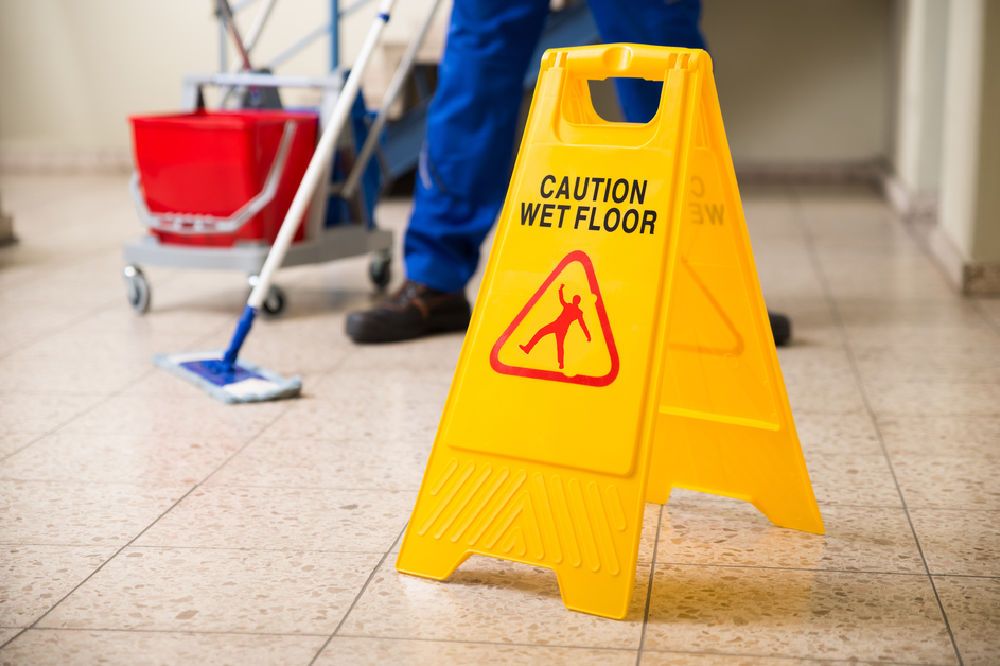You slipped and fell in a store, but the owner doesn’t want to take responsibility. They point to a warning sign posted nearby and claim, “It’s not my fault!”
Does this let them off the hook? The short answer is NO. It’s a myth that a property owner can simply post a sign and avoid all liability when people are injured on their premises.
Slip and fall cases are much more complex than just determining whether or not a sign is present. Here are some important things you should know about warning signs and Indiana premises liability.
Warning Signs Don’t Eliminate Liability
Property owners are required to maintain safe spaces that are reasonably free and clear of hazards. Under Indiana law, property owners must not allow dangerous conditions to persist if they’re aware of them.
Too often, property owners see potential dangers and try to avoid responsibility by doing nothing more than posting a warning sign. While warning signs are effective in many situations, they’re not always enough to prevent injury.
A bold, bright warning sign could still be too small to read, too far away, too poorly lit, or otherwise improper for a variety of other reasons. An employee may have moved the sign or obscured it.
Plus, displaying a warning sign alone might not be fully adequate in terms of legal liability. According to Indiana Law, property owners are responsible for keeping persons legally occupying their property safe. Outright dangerous conditions often call for much more than just posting a warning sign.
Did you encounter any of the following dangerous conditions?
- Loose or broken flooring
- Uneven tiles
- Torn carpet
- Floppy or unsecured floor mats/rugs
- Cracked pavement
- Broken stairways or handrails
- Slippery floors
- Holes or potholes
- Cracks or crevices in the pavement/floor
- Poor lighting
- Missing or burned-out lights/bulbs
- Small or out-of-the-way warning signs
- A sign that was hard to read or understand
Talk to your personal injury lawyer about any signs or conditions that contributed to your slip and fall accident. An experienced lawyer will conduct a thorough investigation and reveal any evidence that could strengthen your case.
When the Sign Itself is a Hazard
You might be surprised to learn that a warning sign can also be considered inadequate if it’s permanently in place and too easy to overlook. When a sign is ever-present, people might ignore it or assume it’s out-of-date.
For example, McDonald’s has been sued for leaving “wet floor” signs out at all times, thus reducing the signs’ effectiveness in alerting restaurant patrons. McDonald’s has also been sued for using floor signs that are tripping hazards, creating dangers instead of preventing them.
As you can see, slip and fall cases can involve many factors. This is why personal injury lawyers and the courts are often involved in evaluating warning signs and related liability. You may have a strong case for injury compensation.
Who Will Be Held Liable for My Slip and Fall Costs?
There are many types of property owners who can be held liable for slip and fall injuries. You may be able to make a claim against:
- A public/government agency
- A private business, commercial landowner, or management company
- A landlord
- A homeowner or property owner
- A homeowners’ association (HOA)
- Your employer
- Another involved party who contributed to your injury
In terms of covering your costs, make sure to evaluate all losses and damages you suffered as a result of your injury. Your total compensation for your slip and fall injury could include:
- Loss of current and future income
- Loss of your enjoyment of life
- Pain and suffering
- Emotional distress
- Medical bills and copays, including hospital bills, prescription medication costs, physical therapy, medical equipment/supplies, and transportation costs
Starting a slip and fall case helps compensate you for the wide range of your losses. While no amount of money can ever ease the full burden of being injured, it comes as a huge relief to resolve your financial worries during such a stressful time.
After a Slip and Fall Injury, Contact Crossen Law Firm
If you slipped and fell on someone’s property, contact Crossen Law Firm as soon as possible. We’ll help you investigate the circumstances of your slip and fall accident, including evaluating any warning signs that might impact your case.
Contact us at 317-401-8626 to learn more about your legal options, and we’ll offer you a free consultation. We have extensive experience with Indiana slip and fall cases and we’re here to help you secure the compensation you deserve.

 317-401-8626
317-401-8626 
.jpg)